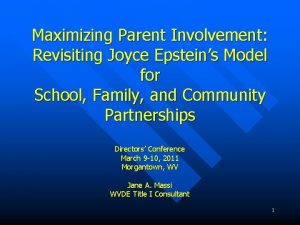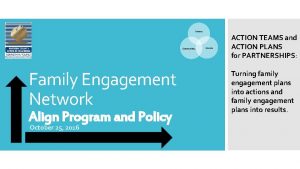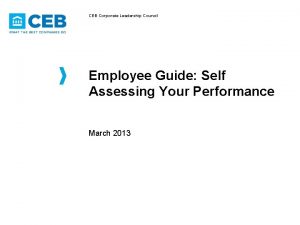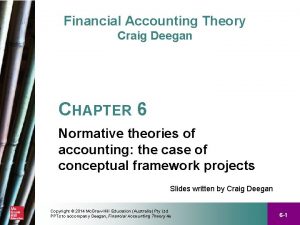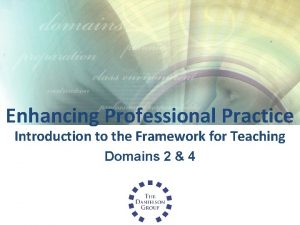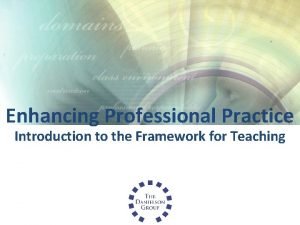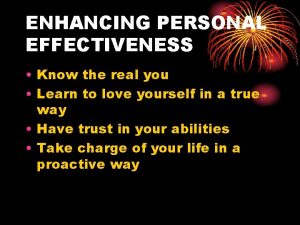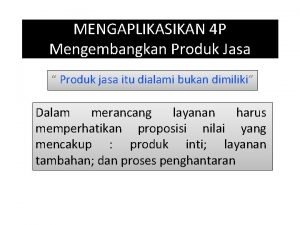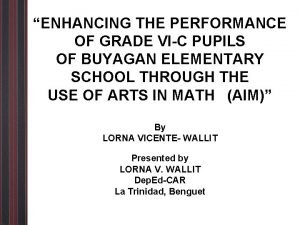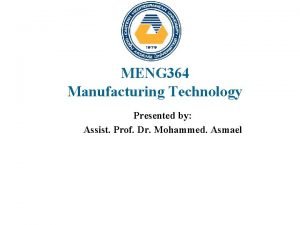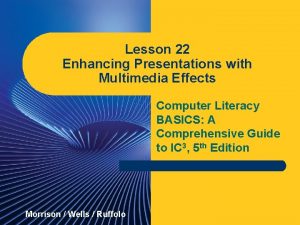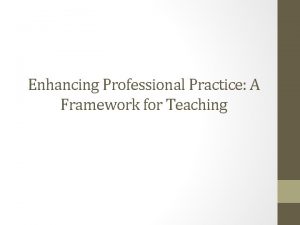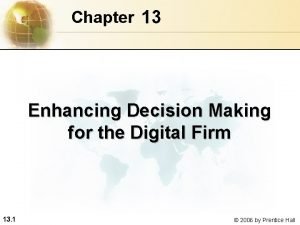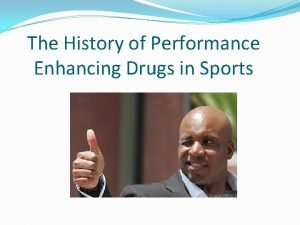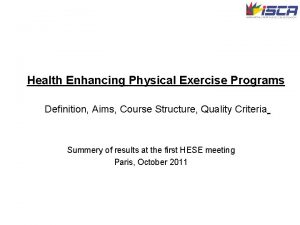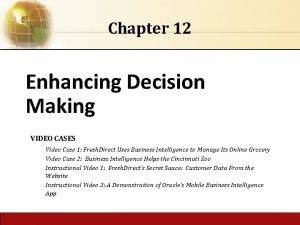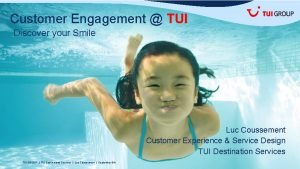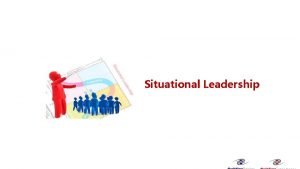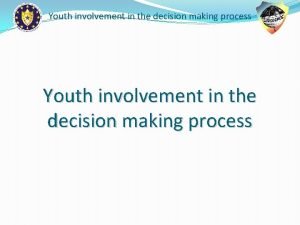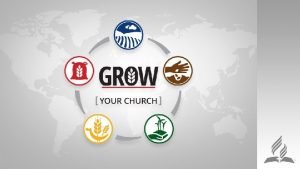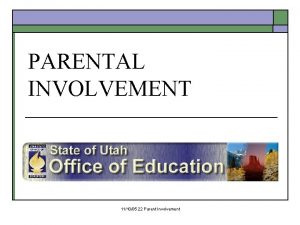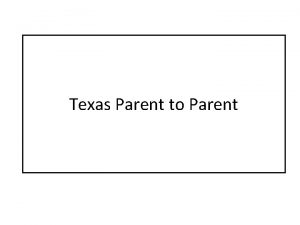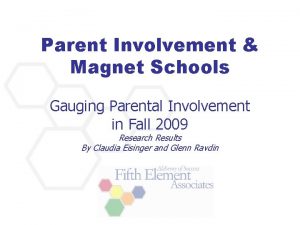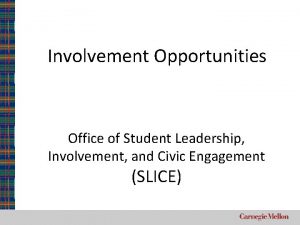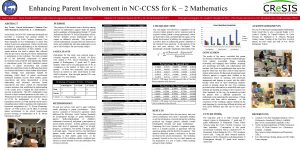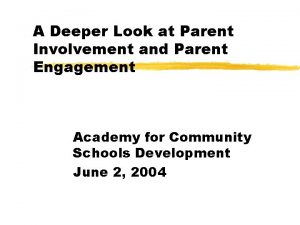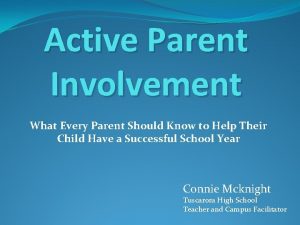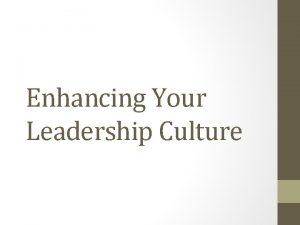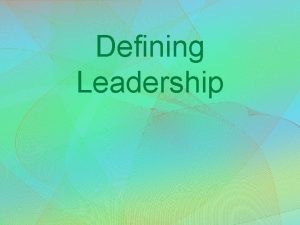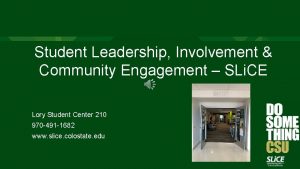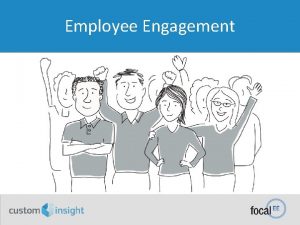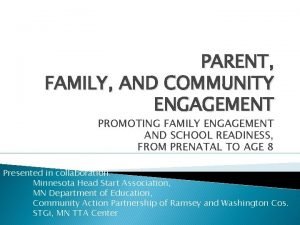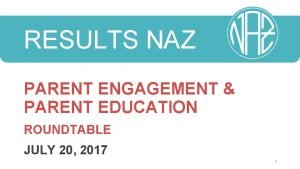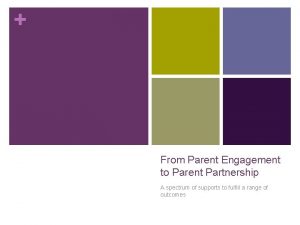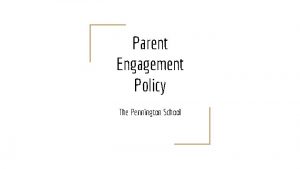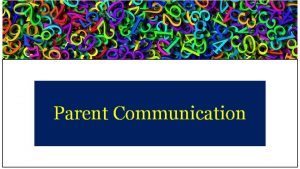PARENT ENGAGEMENT FROM INVOLVEMENT TO LEADERSHIP ENHANCING YOUR

























- Slides: 25

PARENT ENGAGEMENT: FROM INVOLVEMENT TO LEADERSHIP ENHANCING YOUR SKILLS Learning Objectives: 1. Learn Key Concepts as Leaders in Family Engagement 2. Enhance advocacy skills using PTA Standards supported by state initiatives Parent Mentors, Rose Calloway & Edith Abakare

SOCIO-ECOLOGICAL LEADERSHIP MODEL WHERE ARE YOU? Policy Community Organizational Interpersonal Intrapersonal The Social-Ecological Model encourages us to move beyond a focus on individual behavior and toward an understanding of the wide range of factors that influence outcomes.

Social Ecological Model Level Individual Intrapersonal Organizational Community Societal Influences 2 Strategy Factors such as biological, personal Promote attitudes, beliefs and history, attitudes/beliefs that support behaviors sexual violence Relationships with peers, intimate partners, family members Prevention activities example Self Assessment (L/M/H) Educational sessions that encourage individuals to challenge or support issues that are mutually beneficial to both partners. Peer or bystander projects that gives youth tools to change Promote healthy communication and the climate of their social circles by rejecting or intervening behaviors by modeling relationships. when they hear or witness behaviors Without competion between personal ego and the greater cause, is consistent with Level-5 leadership. Presidents Level Five Leadership - respect Abraham Lincoln and Barack Obama, Civil Rights Activist Dr. towards people, selflessness by the Martin Luther King, Jr. and General Colin Powell top the list Applying humility and strong leader, and a strong powerful professional willpower to leadership of executives exemplifying the degree of humility that commitment to achieve results, bring distinguish this class of leader. out the best in subordinates. H H M Factors that increase risk based on community and social environments, Promote a climate in the community Launching a social marketing campaign on a college campus. including an individual’s relationships that by targeting processes or policies. Corresponding workgroup with schools, workplaces, neighborhoods. L Larger, macro-level factors that influence inequality, religious or Promote social norms, policies and cultural belief systems, societal laws norms, and policies that create gaps in service. L Targeting law makers to increase funding for prevention activities in schools. Creating a program that provides them with reasons to promote prevention:

INTRAPERSONAL – PARENT/GUARDIAN Person Focused

INTRAPERSONAL – PERSON CENTERED PLANNING Intrapersonal factors — Characteristics of the individual such as knowledge, attitudes, behavior, self-concept, skills, and developmental history.

INTERPERSONAL – GENOGRAM A genogram is graphical representation of a person's family relationship and medical history. It is a unique type of family research diagram. It not only records family members and their relationships to each other, but also many of their physical and physiological attributes by utilizing an elaborate system of symbols.

INTERPERSONAL – ECOMAP An ecomap helps visualize the social and personal relationships of an individual with everything in the individual's environment or ecosystem. With the individual at the center, it's a map of everything that may affect an individual including interactions with family, friends, business associations, religious community, and any other social or educational groups or clubs.

ORGANIZATIONAL – FAMILY & SELF ADVOCACY Level 1 – Highly Capable Individual

Community Organizational Interpersonal Intrapersonal Organizational – Leadership Level Policy Level 1 – Highly Capable Individual

ORGANIZATION – APS PARENT MENTOR Mentor’s work is focused on enhancing communication and collaboration between families, schools, and communities in order to improve outcomes for students with disabilities and their families. • Families: Parent mentors provide information and resources to parents of students with disabilities on a variety of topics and issues related to home, school, and community. • Schools: Mentors also work with teachers, staff, and administrators to integrate family engagement into school and district activities and to build a culture in which family engagement is expected and valued. • Communities: Parent mentors also work to support integration of students with disabilities into the community by working with partners to build a community in which students with disabilities are included and valued.

SCHOOLS ARE: Bureaucracies (know the Systems) • Bureaucracies work best when: • Tasks are divided by job role (factory). • organizational goals are clear • Group vs. Individualization vs. Budget • Workers have clear roles & separate functions • Standard Operating Procedures are understood • outside classroom vs. inside classroom • Hierarchical and Downward Communication • Bureaucracies resist change Human Organizations (Develop Relationships) • Relationships matter • Organizational climate • Shared goals of the organization • Leadership style • Group norms (values and “rules”) • Behavioral Regularities • Sequential, Reciprocal, and Loose coupling

Standard 1: Welcoming all families into the school community Standard 2: Communicating effectively Standard 3: Supporting student success Standard 4: Speaking up for every child Standard 5: Sharing power Standard 6: Collaborating with community

WELCOMING ALL FAMILIES STANDARD 1

Communicate Effectively Standard 2

Supporting Student Success Standard 3 • THREE COMPONENTS TO A SCHOOL’S CCRPI SCORE: 1. ACHIEVEMENT (60 POINTS) 2. PROGRESS (25 POINTS) 3. CLOSING THE ACHIEVEMENT GAP (15 POINTS) CHALLENGE POINTS (UP 10 POINTS)

SPEAKING UP FOR EVERY CHILD STANDARD 4 • College Program Ø Four year College Ø College specializing in disabilities Ø Two-year colleges Ø Technical schools Ø Non-degree programs • Vocational Programs Ø Supported Employment Ø Competitive Employment (transition support) Ø Competitive Employment (full self advocate) Ø Home and Community Based Programs

SHARING POWER KNOWING YOUR POWER BASE

Sharing Power Standard 5 Collective Impact Backbone Organization Continuous Communication Shared Measurement Common Agenda Mutually Reinforcing Activities

COLLABORATING WITH COMMUNITY PARTNERS STANDARD 6 School (100) NPUs (25) Cluster(10)) Region (4) County City Subject to change – Must be aware of what is going on in your communities (rural, suburban, urban)

COMMUNITY - INTERDISCIPLINARY PARTNERS (STATE LEVEL) STANDARD 6 Georgia Parent Leadership Coalition (PLC): • • • Babies Can’t Wait – Skilled Credentialed Early Interventionists Bright from the Start: Georgia Department of Early Care and Learning Center for Leadership in Disabilities at Georgia State University Georgia Council on Developmental Disabilities Georgia Department of Behavioral Health and Developmental Disabilities Georgia Department of Education, Division for Special Education Supports and Services; Parent Mentor Partnership Georgia Family Connection Partnership Institute on Human Development and Disability at the University of Georgia Parent to Parent of GA – Georgia’s Parent Training Information Center (PTI) • Community — Relationships among organizations, institutions, and informational networks within defined boundaries.

COLLABORATING WITH COMMUNITY PARTNERS (DISTRICT LEVEL) 360 FAMILY ENGAGEMENT STANDARD 6 We are the C. O. R. E. of Student Success • APS Parent Mentors, • Atlanta Council PTA, • Special Needs Committee • Title I Family Engagement Specialists, • Title I Local School Parent Liaisons, • District Homeless Liaison, • ESOL Regional Community Liaisons, • Truancy Intervention Specialist, • District-wide Family Involvement Liaisons • Local School Governance Team http: //www. youtube. com/watch? v=F 72 p 7 a. Byjcs

COLLABORATING WITH COMMUNITY PARTNERS (CLUSTER LEVEL) STANDARD 6 • Cluster Level - Provides on-going support as needed for Title I initiatives, such as Common Core, testing workshop, homework help, Parent 2 Parent Assistive Technology and fingertip technology techniques for parents and students. All other needs/requests are intended to address issues pertaining to Special Needs.

PUBLIC POLICY — LOCAL, STATE, NATIONAL, AND GLOBAL LAWS AND POLICIES. Unlock Original ASK for ICWP: Gradually raise the ICWP Personal Support Services rate to $20/hr. beginning with a $3/hr. increase for FY 2016 Governor's FY 2016 recommendation: No new ICWP increase House budget version: $. 50 per hour rate increase for Personal Support Services covered under the ICWP $1, 329, 428 Senate budget version: $1. 00 per hour rate increase for Personal Support Services covered under the ICWP for Direct Support Professionals $2, 658, 856 Conference committee: $0. 75 per hour rate increase for Personal Support Services covered under ICWP $1, 994, 142 Unlock Original ASK for NOW/COMP: 1, 000 new NOW/COMP waivers for Georgians most in need Governor's FY 2016 recommendation: No new DD waivers House budget version: Senate budget version: Conference committee: Increase funds for 75 additional slots for the NOW and COMP waivers Senate agreed with House No changes from conference committee - 75 slot for NOW and COMP $7, 975, 490 $0 $16, 493, 000 $0 $1, 124, 226

PUBLIC POLICY — LOCAL, STATE, NATIONAL, AND GLOBAL LAWS AND POLICIES. Ga. LEND is a leadership interdisciplinary training program that includes as one of the disciplines Family-Advocacy.

• Edith Abakare Phone: 404 -802 -3607 Email: eabakare@atlanta. k 12. ga. us Rose Calloway Phone: Email: rose@p 2 pga. org Anne Ladd, Family Engagement Specialist Ga. DOE, Division for Special Education Services & Supports aladd@doe. k 12. ga. us 404 -657 -7328 Anne Dirden, Special Education Coordinator Atlanta Public Schools acdirden@atlantapublicschools. us 404 -802 -2633 http: //www. parentmentors. org/ Barbara Pitts, Special Ed Specialist Georgia PTA 5805 Dunn Road bpitts@georgiapta. org 678 -478 -2668 Mark Crenshaw, Director Interdisciplinary Training Center for Leadership in Disability School of Public Health, Georgia State University mcrenshaw@gsu. edu 404 -413 -1385
 Epstein's six types of parent involvement
Epstein's six types of parent involvement Parent engagement network
Parent engagement network Corporate leadership council employee engagement survey
Corporate leadership council employee engagement survey Four enhancing qualitative characteristics
Four enhancing qualitative characteristics Enhancing professional practice
Enhancing professional practice Charlotte danielson framework
Charlotte danielson framework Enhancing personal effectiveness
Enhancing personal effectiveness Contoh pengembangan produk jasa
Contoh pengembangan produk jasa Enhancing thermal conductivity of fluids with nanoparticles
Enhancing thermal conductivity of fluids with nanoparticles Enhancing the performance of grade vi-c
Enhancing the performance of grade vi-c Privacy-enhancing computation
Privacy-enhancing computation Explain property enhancing operations
Explain property enhancing operations Text box formatting
Text box formatting Enhancing professional practice a framework for teaching
Enhancing professional practice a framework for teaching Enhancing decision making
Enhancing decision making History of performance enhancing drugs
History of performance enhancing drugs Health enhancing definition
Health enhancing definition Enhancing decision making
Enhancing decision making Discover your smile
Discover your smile Transformational vs transformative leadership
Transformational vs transformative leadership What is adaptive leadership style
What is adaptive leadership style Situational leadership vs adaptive leadership
Situational leadership vs adaptive leadership Give us your hungry your tired your poor
Give us your hungry your tired your poor Youth involvement
Youth involvement Personal ministry goals
Personal ministry goals Panther involvement network
Panther involvement network
